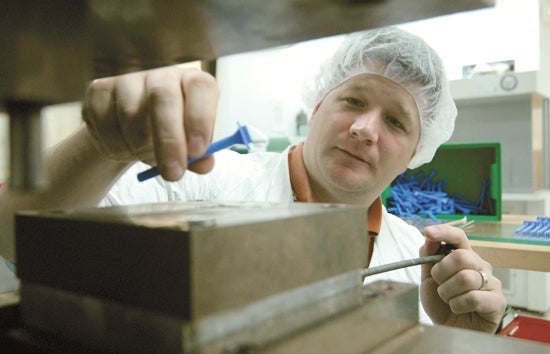With the passage of the historic health care reform bill last month, millions more Americans will get access to health insurance.
But it also means that medical device companies, a prominent industry in the state and Central Massachusetts, now have a new tax.
And that has many companies scrambling to anticipate how the new costs will burden their businesses.
Stuart Montgomery, for example, president of Boston Medical Products in Westborough, said the tax will likely mean his company’s surgical products will increase in cost, putting him at a disadvantage to other international competitors.
“Things are tough without this,” he said. “With this, it’s just another way health care is going to continue to skyrocket in cost.”
Dollars For Devices
The new tax is set to go into effect on Jan. 1, 2013. Companies that sell medical devices in the United States will be taxed at a rate of 2.3 percent of sales within the United States.
U.S. Rep. James McGovern, D-Worcester, voted for the health care overhaul and said he and other members of the state’s delegation fought to limit the size of the tax. Officials expect the tax will bring in about $20 billion over 10 years. An original proposal, McGovern said, would have raised double that amount.
Another rationale for the tax is that with tens of millions more Americans receiving health insurance, there should be increased demand for health care products, such as medical devices.
But Montgomery isn’t buying it.
His company makes surgery equipment for ear, eye and nose surgery, usually for fairly rare forms of cancer. He doesn’t expect many more people to be getting those types of surgeries because more people are insured.
And it isn’t just medical device companies that could be impacted. James Rouse is president and CEO of Arrhythmia Research Technology Inc. in Fitchburg. The company, and its subsidiary Micron Products, makes supplies for medical device manufacturers.
“Let’s say our customers decide to flow down some of the expenses related to this tax, and start asking suppliers to reduce their prices, that could be a concern,” Rouse said.
Startup medical device companies are worried about the tax as well. Geoff Pardo of Facet Solutions Inc. in Hopkinton, is in the midst of developing back pain devices.
“I think it’s easy to look at companies in the medical device and life sciences fields and think you can tax them, but you don’t think about just how much money and investments it takes to bring a technology to market,” he said.
He estimates it could cost between $50 and $60 million to bring the product from conception through development, testing, Food and Drug Administration approval and marketing.
“To face higher taxation once we actually get to commercialization, that just doesn’t help our cause,” he said.
Thomas Sommer, president of Mass MEDIC, the state’s medical device industry council and trade group, said his group represents about 225 medical device companies in New England that contribute about $7.5 billion to the regional economy and employ more than 21,0000 workers.
“Companies are going to have to figure out if they want to pass this cost on to the end users, the hospitals and doctors, which will increase the cost of health care, or absorb the costs and possibly make cuts to employee counts to research and development,” he said.
That’s a very real decision Richard Packer, CEO of Zoll Medical Corp. in Chelmsford said he’s facing. The company makes defibrillators and cardiac resuscitation products and employs 1,800 workers. The company began in the early 1980s and expects to have $440 million in revenues internationally this year, about 70 percent of which is in the United States.
If the tax had been levied on the company this year, it would be about a $7.5 million bill out of the company’s about $9.5 million profit. “The tax would have essentially wiped out last year’s profit,” Packer said.
Smaller profits would likely mean cutbacks in research and development. The other option, he said, is to look at outsourcing.
“We like being in Massachusetts, but we’re not here because it’s the lowest costing place to do business,” he said. “We’re here because we can afford to. If we no longer have those choices, then there are cheaper places around the globe we could go.”

